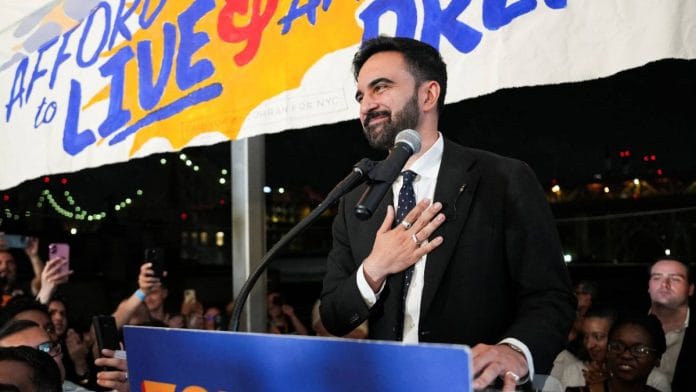Growing up in India, I often heard that democracy was where the silenced finally found a voice. And now New York City seems to be finding a new voice. The capital of capitalism might soon elect a socialist as its mayor. Whatever one thinks of Zohran Mamdani—the 34-year-old state assemblymember once dismissed as an outsider—his rise marks an extraordinary turn in American politics. For the Democratic Party, and for the city that defines so much of America’s identity, his potential victory isn’t just another election result. Some are already calling it the most significant breakthrough for socialism in modern US history.
Mamdani’s campaign speaks to the everyday struggle of city life—rent, transport, and survival. Endorsements from Bernie Sanders and Alexandria Ocasio-Cortez have turned it into something larger, a test of what the American Left can still mean to people.
But with that hope comes unease.
The race has exposed the cracks within the Democratic Party and within the South Asian community. The vote seems divided. What’s more surprising is that despite his open criticism of Israel, Mamdani is leading among Jewish voters. Political loyalties are changing. People are choosing conviction over comfort, even when it unsettles the familiar lines of identity.
Following Indian politics means religious polarisation has long stopped being shocking. But seeing similar methods surface in New York’s mayoral race feels both ironic and unsettling. Mamdani’s Muslim identity has become an easy target.
“God forbid, another 9/11—can you imagine Mamdani in the seat?” said former governor and independent mayoral candidate Andrew Cuomo on a conservative radio show. The host, Sid Rosenberg, replied, “He’d be cheering,” to which Cuomo laughed and added, “That’s another problem.”
It’s the same old playbook, fear dressed up as caution, prejudice disguised as concern. That such words can echo in the heart of the world’s most diverse city shows how thin the line really is between democracy and demagoguery.
Also read: New York, New Comrade. Mayor Mamdani and his India-style socialism
The real American
But interestingly, such tactics seem to be failing in America. We’ve seen this before during Barack Obama’s campaign, when conservatives kept emphasising the “Hussein” in his name, as if it were proof of something sinister. It didn’t work then, and looking at the current polls, it doesn’t seem to be working with Mamdani either. And that in itself says something—despite all the noise, fear still has its limits. People are learning to separate a name from an agenda, faith from politics.
Mamdani’s surge in popularity seems to be a clear expression of frustration with the politics of the Trump era. It’s what makes this election bigger than one candidate; it’s a way for people to push back against Trump’s style of governance. The massive turnout for the “No King” protests mirrors the same sentiment—a rejection of authoritarian impulses and the consolidation of power, a refusal to accept politics that sidelines dissenting voices. Mamdani’s rise is a reflection of that collective exasperation.
At the same time, Mamdani’s candidacy forces uncomfortable questions about identity and belonging: who counts as a “real American”? On the surface, it’s absurd—but in the hands of some, it becomes a weapon. Republican Congressman Randy Fine of Florida and Andy Ogles of Tennessee, both vocal supporters of Donald Trump, have gone so far as to urge the federal Justice Department to scrutinise Mamdani’s path to citizenship. It’s not about policy or capability; it’s about identity, about using belonging as a litmus test for legitimacy.
And that leads to the deeper question: Does Mamdani’s rise mark a shift in how we see American politics—or how immigrant communities see themselves within it? Because victory in the primary means little if the coalition dissolves when the general election hits. The moneyed interests, the corporate backers, the power brokers—they’re turning their attention now.
There’s history being made, but there’s also a test ahead. Will this moment push politics toward inclusion, or will it buckle under its own weight? Will Mamdani become a mayor who governs for all New Yorkers—or the mayor of his base, celebrated until the city asks him to deliver beyond them?
Amana Begam Ansari is a columnist and writer. She runs a weekly YouTube show called ‘India This Week by Amana and Khalid’. She tweets @Amana_Ansari. Views are personal.
(Edited by Theres Sudeep)






